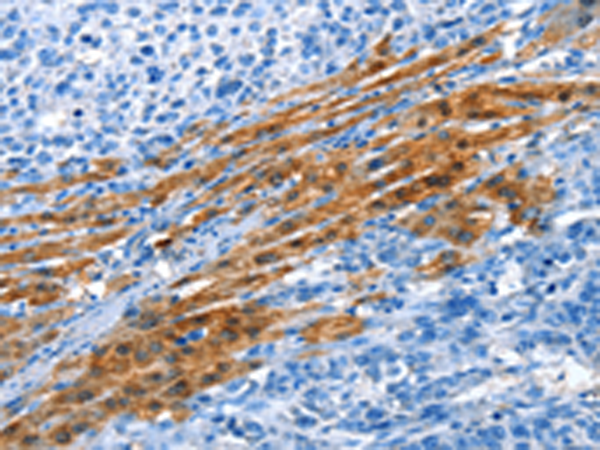
| WB | 咨询技术 | Human,Mouse,Rat |
| IF | 咨询技术 | Human,Mouse,Rat |
| IHC | 1/25-1/100 | Human,Mouse,Rat |
| ICC | 技术咨询 | Human,Mouse,Rat |
| FCM | 咨询技术 | Human,Mouse,Rat |
| Elisa | 1/2000-1/5000 | Human,Mouse,Rat |
| Aliases | ADH-2 |
| Host/Isotype | Rabbit IgG |
| Antibody Type | Primary antibody |
| Storage | Store at 4°C short term. Aliquot and store at -20°C long term. Avoid freeze/thaw cycles. |
| Species Reactivity | Human |
| Immunogen | Fusion protein of human ADH4 |
| Formulation | Purified antibody in PBS with 0.05% sodium azide and 50% glycerol. |
+ +
以下是关于ADH4抗体的3篇参考文献及其摘要概括:
---
1. **"Hominoid adaptation of enzymatic alcohol metabolism: ADH4 evolution in primates"**
*Authors: Carrigan et al. (2015)*
摘要:研究通过抗体检测ADH4蛋白在灵长类动物中的表达,揭示其在进化过程中因饮食变化(如摄入发酵果实)产生的功能适应性突变,抗体用于比较不同物种肝脏组织中ADH4的活性水平。
2. **"ADH4 as a prognostic marker in gastric cancer: Immunohistochemical analysis"**
*Authors: Yokoyama et al. (2018)*
摘要:利用ADH4抗体对胃癌组织进行免疫组化分析,发现ADH4高表达与患者不良预后相关,提示其可能通过调控肿瘤细胞增殖和侵袭参与胃癌进展。
3. **"Alcohol dehydrogenase 4 modulates oxidative stress in alcoholic liver disease"**
*Authors: Stacey et al. (2020)*
摘要:通过Western blot和免疫荧光技术(使用ADH4抗体),研究发现ADH4在小鼠肝脏中高表达会加剧酒精诱导的氧化应激损伤,表明其在酒精性肝病中的潜在病理作用。
---
以上研究均涉及ADH4抗体的应用,涵盖进化生物学、癌症机制及肝病领域。如需具体文献,建议通过PubMed或Sci-Hub检索标题或作者获取全文。
The ADH4 antibody targets alcohol dehydrogenase 4 (ADH4), a member of the alcohol dehydrogenase (ADH) enzyme family encoded by the ADH4 gene in humans. ADH4. also known as class II ADH, is primarily expressed in the liver and gastrointestinal tract. It plays a role in oxidizing various substrates, including ethanol, retinol, and lipid peroxidation products, contributing to alcohol metabolism, retinoid homeostasis, and oxidative stress responses. Unlike other ADH isoforms, ADH4 exhibits distinct substrate specificity and catalytic efficiency, particularly in metabolizing larger alcohols and aldehydes.
ADH4 antibodies are essential tools for studying the enzyme's expression, localization, and function in physiological and pathological contexts. Researchers use these antibodies in techniques like Western blotting, immunohistochemistry, and ELISA to investigate ADH4's role in diseases such as alcoholism, liver disorders, and certain cancers. For example, altered ADH4 expression has been linked to alcohol-related tissue damage and carcinogenesis, making it a biomarker candidate. Additionally, ADH4 polymorphisms are associated with genetic predispositions to alcohol dependence.
Commercial ADH4 antibodies are typically raised against specific epitopes of the human ADH4 protein, requiring validation for species reactivity and application compatibility. Their utility extends to both basic research and clinical studies, aiding in understanding metabolic pathways and disease mechanisms.
×